Attending the Conference were Associate Professor, PhD. Nguyen Duc Minh, Vice President of Vietnam Academy of Social Sciences; Representatives of the Embassies of the Republic of India, Saudi Arabia, United Arab Emirates (UAE), Japan, and Iran in Vietnam; Foreign scholars: Professor. Manjit Das, Director of the Center for South and Southeast Asian Studies, Bodoland University, Professor. Fang Tien-sze, Deputy Director of the Center for Indian Studies, National Tsinghua University, Taiwan, China, PhD. Tomoomi Mori, Setsunan University, Japan and scholars, researchers, diplomats from research institutes, universities, Ministry of Planning and Investment, diplomatic agencies; scientists, research institutes, universities and international organizations in Vietnam.
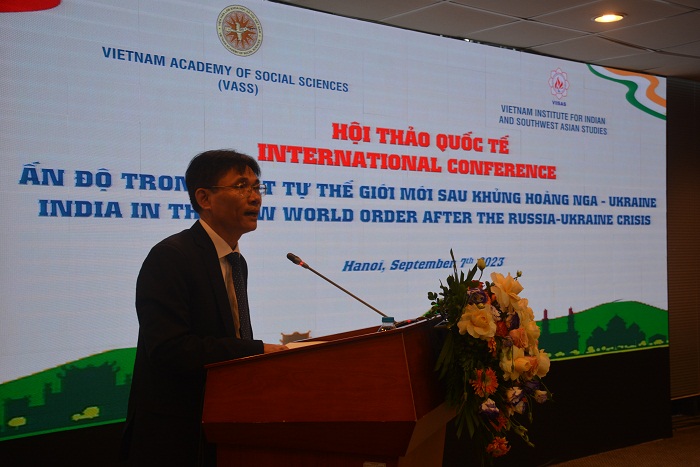 |
|
Associate Professor, PhD. Nguyen Duc Minh, Vice President of the Vietnam Academy of Social Sciences, delivered a welcome speech to the Conference
|
Since Russia launched the special military campaign in Ukraine from February 24, 2022 until now, the Russia-Ukraine conflict has not only created a tectonic shift in European history, but also affected deeply affecting the world order, disturbing the global order formed after the Cold War. The determination of Russia, the rise of China, the tough policy of the US and Western countries when using absolute economic, financial and cultural advantages to exert total non-military pressure. The force that forced Russia to withdraw its troops from Ukraine caused many new developments in the balance of power and the gathering of forces in the world situation.
In that context, India, as a rising major country, has taken its own steps and strategies to demonstrate its role, voice and responsibility in global issues. While the US and the West vehemently condemn Russia, India maintains a policy of active neutrality, and focuses on ensuring the safety of Indian citizens in Ukraine. India declared its "strong opposition to the conflict", stood on the "peaceful side" and called for the Ukraine conflict to be resolved through diplomacy and dialogue, and at the same time, expressed its desire for all parties involved to about there being no other option than diplomacy and dialogue, the global order (must) be based on international law, the United Nations Charter and respect for the territorial integrity and sovereignty of nations family. India's neutral attitude has caused many different reactions, and raised big questions about India's position, role, and influence in the world order.
Speaking to welcome the Conference, Associate Professor, Dr. Nguyen Duc Minh, Vice President of the Vietnam Academy of Social Sciences, warmly welcomed distinguished guests, scientists, delegates from diplomatic agencies, Domestic research institutes and training facilities, especially scientists from Universities of India, Taiwan (China), and Japan attended the Conference.
Associate Professor, Dr. Nguyen Duc Minh said that the geopolitical, military and diplomatic conflict between Russia and Ukraine is having a profound impact on the world's political, economic, social and security life and still unpredictable developments. This conflict should probably be evaluated as one of the major events in contemporary world history. The Russia-Ukraine conflict not only challenges the intelligence and response ability of the international community but also reminds us of the importance of cherishing peacekeeping, promoting cooperation and development, and The international community needs to strengthen diplomatic efforts to find reasonable solutions to resolve conflicts and promote regional peace and stability.
Vice President Nguyen Duc Minh emphasized that India is a powerhouse with the 5th largest economy in the world. India is making an important contribution to world order and is present as a "balancing force" ensuring the stability and safety of the entire region. India is not only an important partner of countries around the world but also an indispensable growth pole of the global economy. During the Russia-Ukraine conflict, India is one of the countries that can dialogue with all other major countries such as the US, Russia, the European Union, Japan or China. At the same time, when efforts to end the Russia-Ukraine conflict have not yet achieved the expected results, the world is expecting India, as G20 Chairman, to save the day by supporting the organization of dialogues. high-level meetings between Russia, Ukraine, the US and Europe through official and unofficial dialogue channels.
The Vice President hopes that, based on the proposals, recommendations and solutions at the Conference, the Organizing Committee will have a report sent to the Academy and relevant agencies to promptly serve the planning and implementation work. current foreign policy.
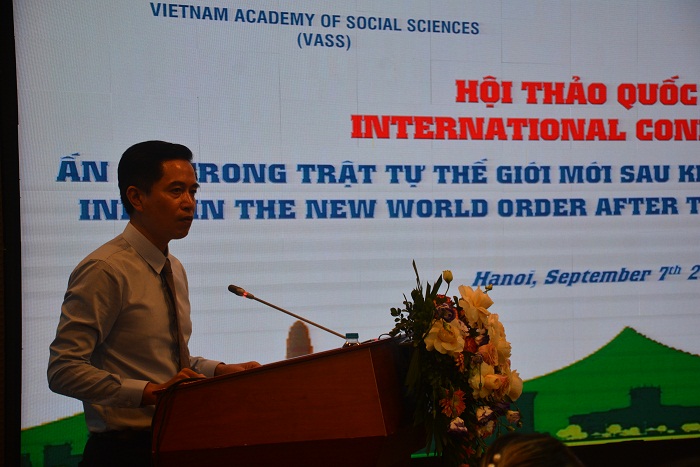 |
|
Dr. Pham Cao Cuong delivered the opening speech at the Conference |
Speaking at the opening of the Conference, Dr. Pham Cao Cuong - Deputy Director in charge of the Institute of India and Southwest Asian Studies (VIISAS) said that India's position on the world order after the Russia-Ukraine crisis is clearly shown when India chooses to choose to support a multipolar world order, support multilateralism, and pursue a policy of multi-alignment, building alliances with like-minded partners instead of alliances, supporting support a new world order based on 21st century realities.
Also according to Dr. Pham Cao Cuong, India is currently one of four Comprehensive Strategic Partners of Vietnam. Over the past decades, despite experiencing complex changes in the regional and world situation, Vietnam - India relations have always maintained a sustainable friendship and are increasingly developing well. The two countries also have many commonalities on regional and international issues, contributing to consolidating peace and prosperity of Southeast Asia in particular and the Indo-Pacific in general. Therefore, a comprehensive analysis of India's response to the Russia-Ukraine crisis and an assessment of India's role and position in a volatile new world situation will help us. Deeper understanding of India's policies and strategies in the current context.
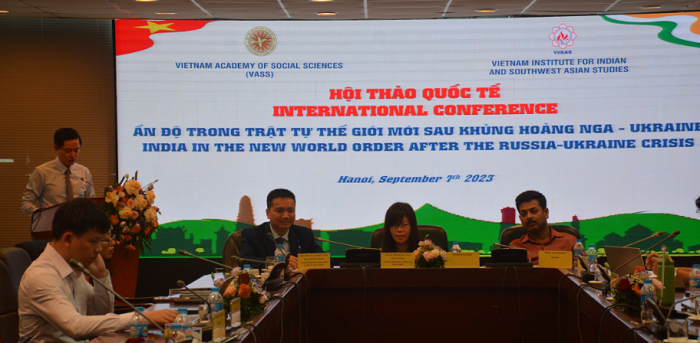 |
|
Chủ tọa điều hành Hội thảo |
Deputy Director Pham Cao Cuong hopes to receive many opinions from delegates to clarify India's self-awareness of its role in the world order and the awareness of other countries and institutions about India; Assess India's impact and influence on the world order, relationships and development institutions in the world; The impact of the new world order on countries, pairs of bilateral relations, related triangles, domestic and foreign politics, development strategies and cooperation opportunities of countries; The challenges that the Russia-Ukraine crisis poses to regional institutions such as SAARC, ASEAN and to the shaping of the Indo-Pacific regional structure. On that basis, make suggestions and recommendations for Vietnam.
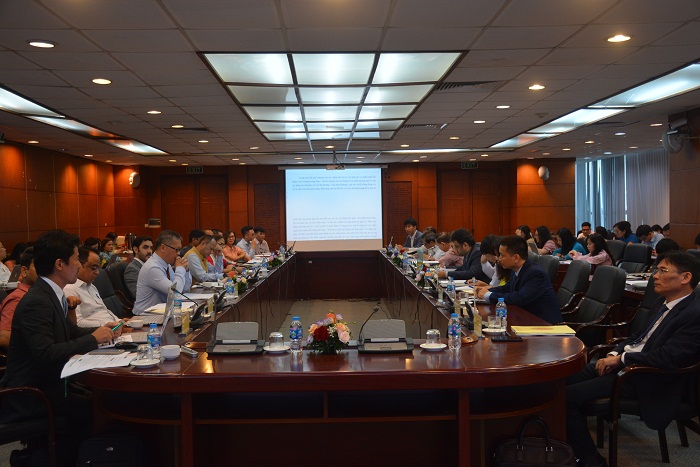 |
|
View of the Conference |
The conference received many reports sent to the Organizing Committee, articles with in-depth and comprehensive analysis of aspects such as: (i) The Russia-Ukraine military conflict and its impacts on international relations. triangular system India - Russia - China; (ii) India's strategic autonomy diplomacy viewed from the Ukraine crisis; (iii) Impact of the Ukraine crisis on India-US relations: Viewed from Indian Prime Minister Narendra Modi's visit to the US in June 2023; (iv) India-Russia relations during the Russia-Ukraine conflict; (v) India's strategic choices in the new world order after the Russia-Ukraine crisis; (vi) India's stance on the Russia-Ukraine crisis: Viewed from India's national interests; (vii) Explain the origins and goals of the US and NATO in the Russia-Ukraine conflict; (xiii) Impact of the Russia-Ukraine crisis on India's foreign policy; (ix) Impact of the Russia-Ukraine Crisis on the Indian economy; (x) Impact of the Russia-Ukraine crisis on the Indian economy; (xi) China-Russia defense cooperation since the Russia-Ukraine crisis...
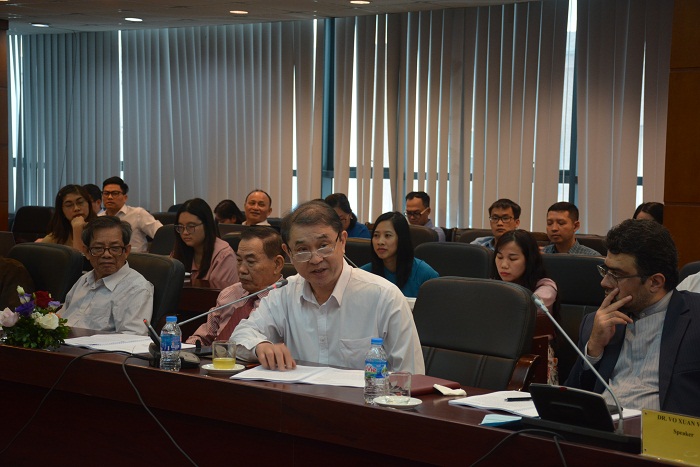 |
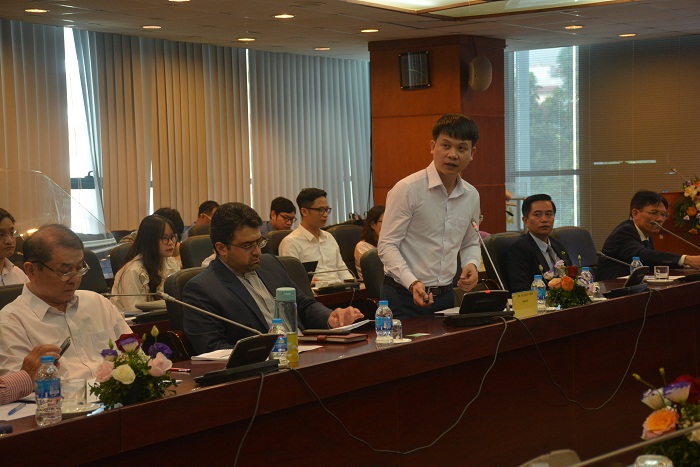 |
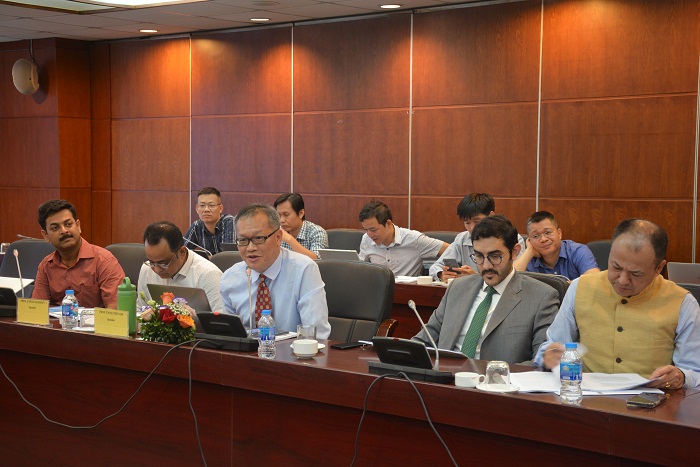 |
|
Delegates spoke and presented papers at the Conference |
The conference received many comments from delegates, experts and scientists. The reports and opinions expressed at the Conference focused on exchanging, discussing, and comprehensively analyzing (i) India's role and position in the new world order after the Russian crisis. -Ukraine from many different approaches. It clarifies India's self-awareness of its role in the world order and the awareness of other countries and institutions about India. (ii) Assess India's impact and influence on the world order, relationships and development institutions in the world, and make suggestions and recommendations for Vietnam. (iii) In addition, the workshop also analyzed practical issues that need direction such as: challenges and opportunities for Vietnam - India relations in the context of the Russia - Ukraine conflict...
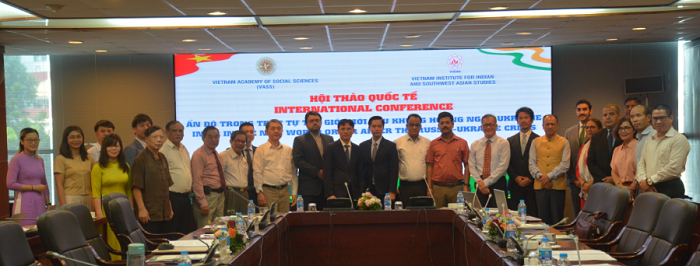 |
|
The participating delegates took souvenir photos |
The conference is an open, professional and frank academic forum to discuss India's role, position, and response to the world order after the Russia-Ukraine conflict, thereby providing scholars and policymakers with updated and useful information related to the Russia-Ukraine conflict as well as India's policy response to this event.
P..V







